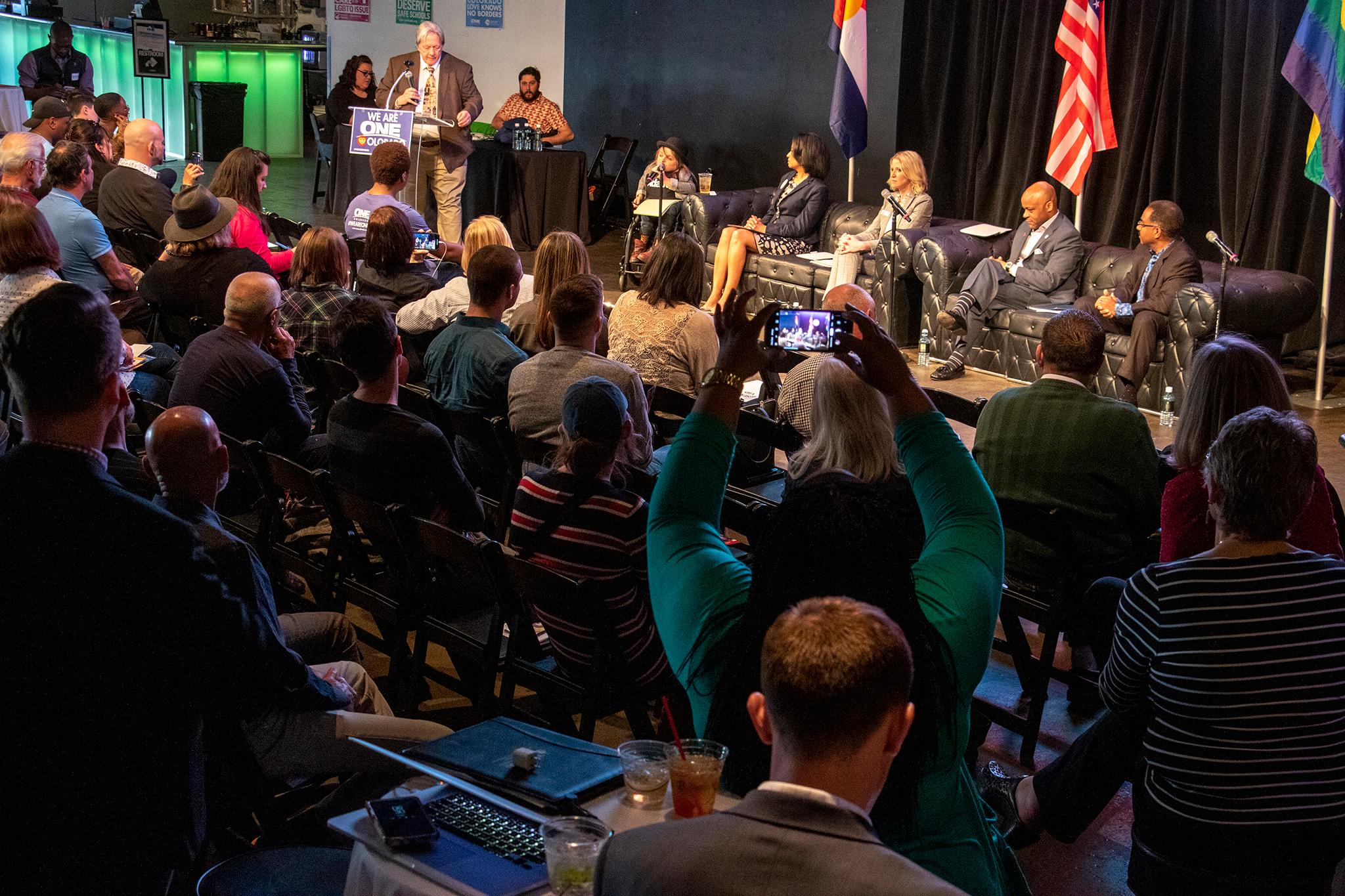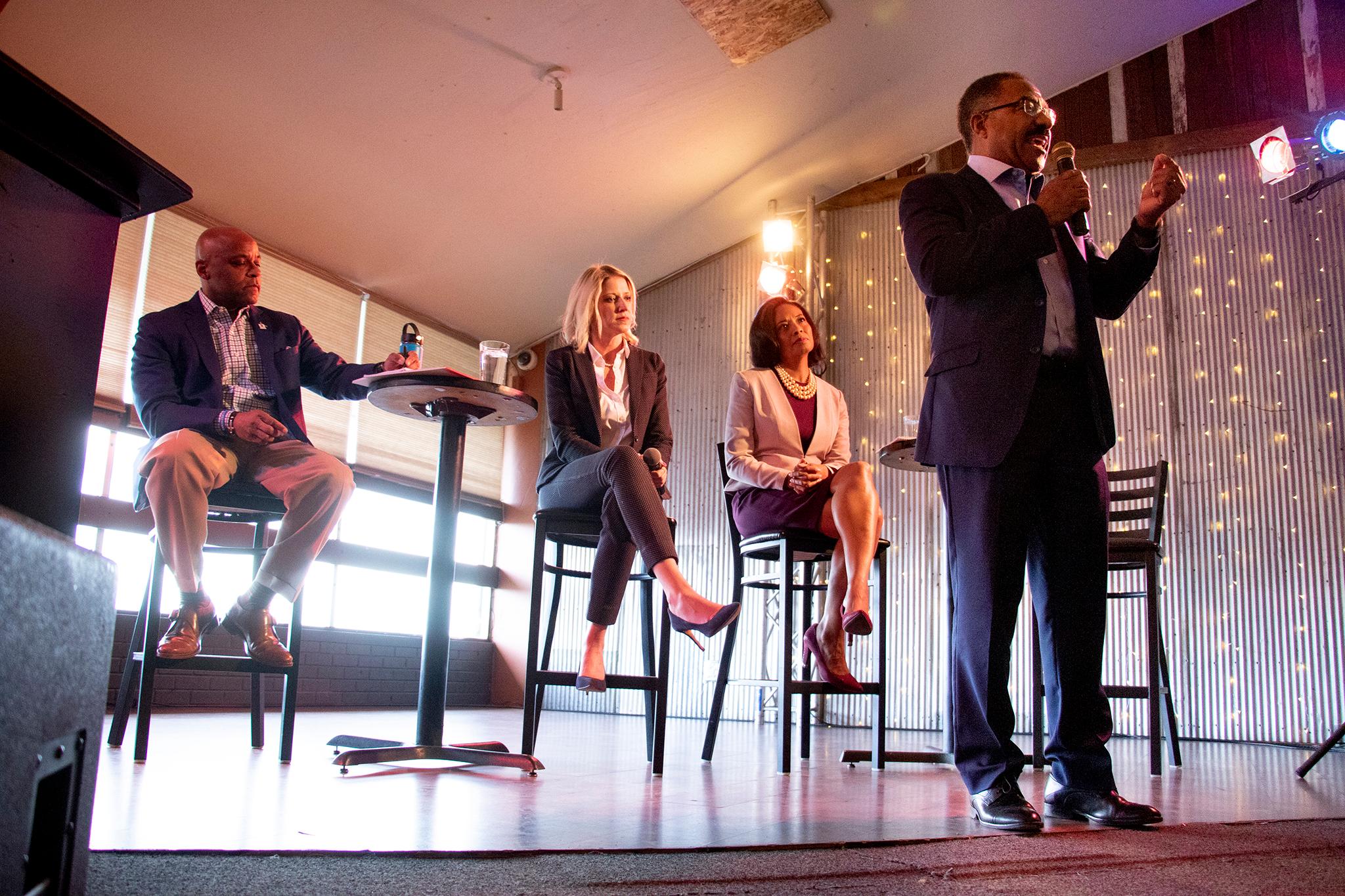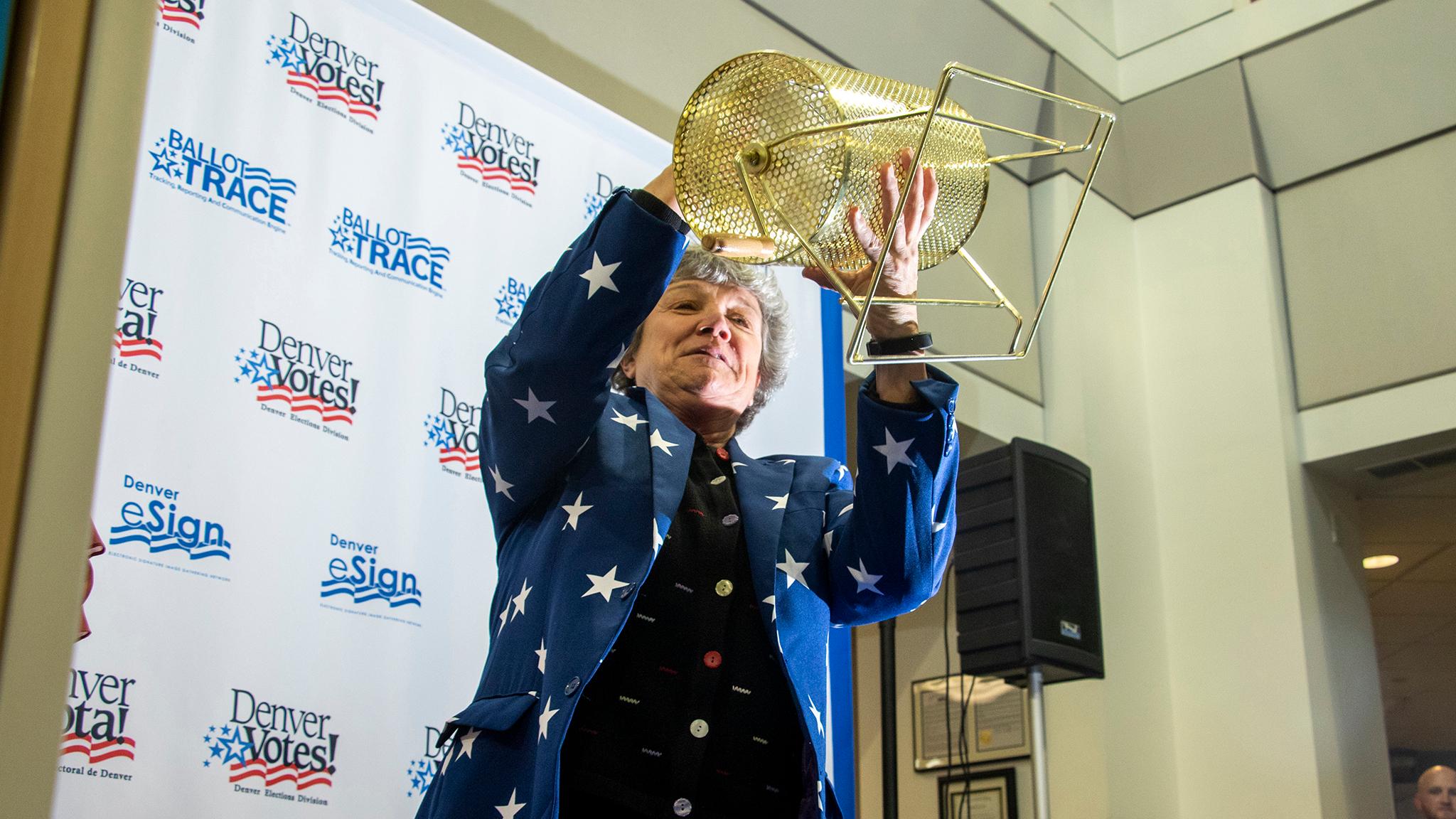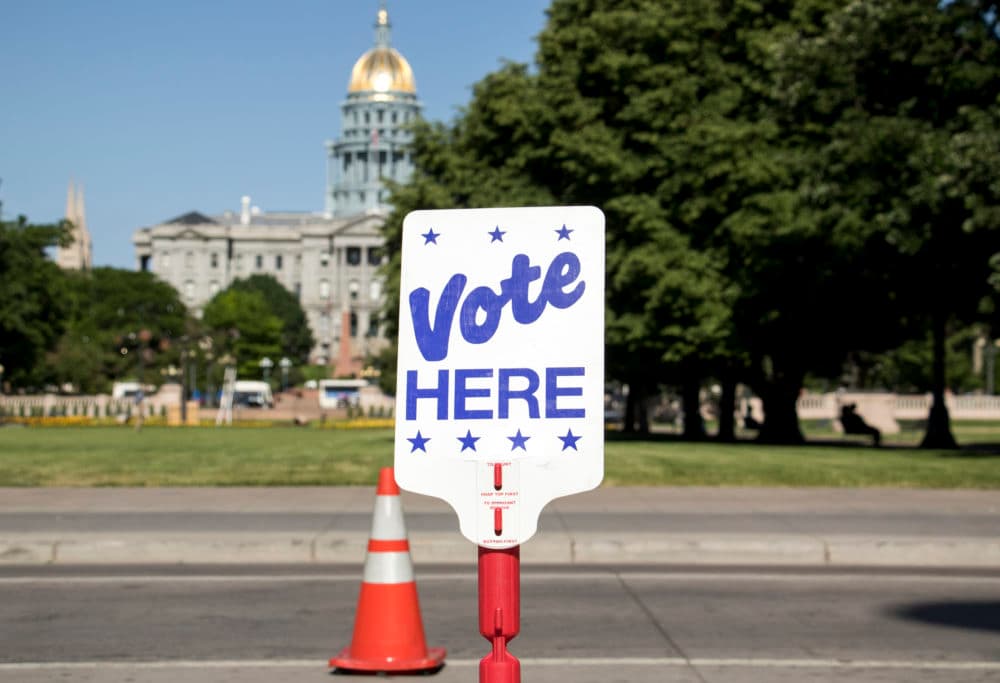Leer sobre la elección en español.
Fire up the ol' thinking organ, it's civic engagement time.
We know, it was only half a year ago that you filled out the longest ballot in Denver history, but it really is time to vote again. This election, held on May 7 (you can vote as soon as you receive your mail ballot in mid-April), is a municipal election. That means Denver residents will be voting on Denver things. We'll be picking a mayor, a clerk and recorder, a city auditor and a whole bunch of City Council members. We also have two initiatives to vote on -- one that would decriminalize psilocybin mushrooms and one that would repeal the city's urban camping ban.
If you've been following along, you've seen a lot of Denverite stories explaining the issues and profiling the candidates. In the interest of saving everyone some site-searching, we've condensed it all into this guide (with plenty of links out to the meatier explainers).
Grab your ballot and get to it.
Mayor
It's kind of a big decision.
Denver has a "mayor strong" government and the mayor has a little more power than in some other cities. For one thing, the mayor's office sets the city budget. For another thing, the mayor has power over the City Council, ultimately deciding whether or not the laws council creates actually become law.
So, yes, who we give that power to is pretty important.
Who's running:
Lisa Calderón: Lisa Calderón's platform centers on affordable housing, "resident-led" development, decentralizing the mayor's office, and women and workers.
Calderón co-chairs the Colorado Latino Forum, which works to bolster political strength and civic engagement among Latinos. The activist also founded the Community Reentry Project, a nonprofit to help former inmates flourish in society after jail.
Here's a deeper profile of her.
Stephan Elliot Evans (better known as Chairman Sekú): If you've ever been to a Denver City Council meeting, you've been in the presence of Stephan Elliot Evans, who goes by Chairmen Sekú.
Sekú, who is a member of Black Star Action Network for Self Defense, said his first issue is crime. The activist said he would lift the ban on openly carrying guns in city limits "because people have to protect themselves." He also said he would end the urban camping ban and give residents a greater share of the wealth wrought from development.
He first ran for mayor in 2011.
Jamie Giellis: Jamie Giellis helped develop and lead the RiNo Art District, a branded geographic area in the River North section of Five Points that works with businesses to finance neighborhood improvements.
If elected, she would focus on housing, transportation, environmental sustainability and education, she told Denverite. Moving people more efficiently with transit and biking is another goal.

Michael Hancock (incumbent): Michael Hancock has presided over the city since 2011, so he's overseen several years of unprecedented growth and development. He's running for his third and final term.
Hancock, along with the city council, created Denver's first-ever affordable housing fund. Still, the mayor has quarterbacked the city during a period of increasing gentrification and displacement.
His administration has made the intersection of transportation and housing a priority on paper this year, releasing new plans for transit, land use, walking and parks under the banner of "Denveright."
Sexual texts sent by Hancock to a subordinate, Detective Leslie Branch-Wise, have scarred his tenure. He apologized after the news surfaced.
Kalyn Rose-Heffernan: You may know Heffernan as the voice of Wheelchair Sports Camp, an experimental hip-hop group. Or as an activist fighting against displacement from gentrification. The 31-year-old is also a teacher at Youth on Record.
She's running on a platform of access: access to shelter for people experiencing homelessness, to higher income, to education, to food, to water and to convenient public transportation. The candidate, who uses a wheelchair, said she would invest significantly in transit, work to repeal the urban camping ban and "redistribute the wealth and the power from the bottom up rather than the top down."
Penfield Tate III: Penfield Tate is looking to restart his political career after 15 years away from elected office. He's served as a state representative and state senator, but hasn't held office since 2003.
Tate says he would rein in what he sees as poorly planned growth in order to preserve small businesses and affordable homes, and would address homelessness and affordable housing by working with the private sector, particularly nonprofit developers, to come up with "more creative" ways to incentivize new attainable homes.
Here's what else the candidates are saying.
In a March 21 forum, Hancock, Calderón, Giellis and Tate discussed climate change and sustainability. Rose-Heffernan was invited but sat outside in protest of the $15 admission.
With varying degrees of specificity, the candidates said they would take steps to reduce pollution and put Denver on track to a sustainable future.
Dave was there, and he condensed it all into useful bullet points for you.

Dave was also there for an April 1 forum featuring the same four candidates, hosted by the Denver Post.
There was a lot of talk about housing, homelessness, development and transportation -- of course -- and promises to make Denver better.
The highlights? YIMBYs, NIMBYs, a golf course and cars, Dave reported. Dive into that here.
Denver City Council
Let's start by answering this question: What does Denver City Council do?
Denver has 13 city council people, and that's their full-time job. Eleven of them represent distinct districts divided by population. Two represent the entire city. Most members are Democrats, but the office is technically apolitical.
The City Council can:
- adopt or reject the budget;
- make laws;
- approve large contracts;
- dictate how land is used;
- adopt consequential plans;
- investigate government departments;
- and some other things.
So this is pretty important, too.
If you don't know which district you live in, you can consult or click through this map:

So who's running? Kevin Flynn is unchallenged in District 2, as are Paul Kashmann in District 6 and Jolon Clark, current City Council president, in District 7. Most of the other races are much more crowded. Let's dig in.
At-Large
Robin Kniech (incumbent): Kniech's eight years on the council have been characterized by some pretty sweeping policies, including the $15 minimum wage she set in motion (along with the Hancock administration) for city workers and many of its contractors.
Some big priorities for her next term, should voters re-elect her: Coming up with a funding source for transportation -- particularly infrastructure for transit, biking and walking -- by 2020 to "support urban centers rather than supporting sprawl." She wants to continue to work on housing and homelessness issues and work towards her "housing for all" platform.
Johnny Hayes: Hayes is an artist and historian who wants to focus on homelessness, mental health and renter protections, as well as the advancement of Denver's deaf community.
Aside from giving residents basic necessities like shelter, water and food, his primary goal is to ramp up Denver's mental health services for people without homes.
If elected, Hayes says he would protect renters with unspecified policies that would give them more rights to stay housed.
Lynne Langdon: Langdon is a newcomer to Denver's civic scene.
Two things Langdon is definitely against: supervised use sites, also known as safe injection sites, which let drug users ingest under the watch of medical professionals to stop overdoses, and letting people without homes sleep on public streets.
She lacks many specific policy goals -- she's more interested in scoping out the landscape and reacting in the way she thinks best.
Deborah Ortega (incumbent): Ortega has spent 21 of the last 32 years as a city councilwoman -- first as north Denver's District 9 rep and more recently as a citywide official.
She wants to rein in what she considers one-off developments being built without enough "comprehensive planning." If re-elected, she wants to keep watchdogging that process, fight for environmental justice and monitor a possible expansion of I-25.
Jesse Parris: Parris is another candidate aiming to oust the establishment.
A member of Denver Homeless Out Loud, Parris is quick to call Denver the "Mile High Income City" and tell Denverites that "we need to sweep the council like they sweep the homeless," referring to the city's ban on urban camping.
On the housing side, the candidate says he would require at least half of every new development to include housing affordable to people making between zero and 30 percent of the area's average income -- a radical departure from a system that lets developers opt out of building affordable homes if they contribute to an affordable housing fund.
Tony Pigford: Pigford is part of a contingent of first-time candidates looking to wrest control from established electeds and change Denver's trajectory. Sparked to run by the Ink! Coffee protests, he sees a city that's gotten away from supporting the general public's social, economic and health needs in favor of prosperity for the few.
He has co-led a ballot initiative to let Denverites vote on allowing the Olympics, co-led the voter-approved campaign finance initiative aimed at evening the playing field for candidates with less money, and has advocated against the city's and CDOT's I-70 expansion through long-neglected north Denver neighborhoods.
District 1

Victoria Aguilar: Aguilar is a Sunnyside native who works as a Denver Human Services employee and specializes in immigrant and refugee services.
She wants to focus on creating and preserving housing for the district's middle-class and lower-income residents, pushing for affordable housing requirements in new developments and establishing an incentive fund to help homeowners in the district stay in their homes.
Sabrina D'Agosta: D'Agosta left her job with Denver Public Schools to campaign full-time.
She wants community voices to be part of the neighborhood planning process, supporting local businesses, increased investment in infrastructure and addressing what she feels are some "alarming trends" in crime in the district.
Scott Allan Durrah: Durrah works as COO of Simply Pure Colorado.
He wants to create a path to homeownership for local renters, work with developers toward more responsible development, expand vocational training programs for high school students and support small businesses by advocating for these businesses being part of mixed-use developments with retail space.
Praj Kulkarni: Kulkarni is an IT employee who works from home.
He will be an advocate for building more accessory dwelling units, developments that can repurpose existing structures into affordable rental units, streamline the permit process in the city and support development that's sensitive to what's already there and fits well with the neighborhood's current aesthetic.
David Sabados: Sabados is a consultant at Compass Strategy Group.
He would like to see more renter protection, more accessory dwelling units, work to expand the city's public transit options to create more lines and more frequent buses, and make mass transit more available for folks in the city proper.
He supports a state bill allowing local governments to set minimum wages and supports expanding the minimum wage increase to all Denver residents.
Amanda Sandoval: Sandoval is the legislative liaison and outreach program coordinator for the Denver Fire Department.
She wants to ensure new development weaves neatly into the existing neighborhood fabric by using more zoning overlays, expedite the permit and review process for developers who meet the minimum affordable housing requirements set by the city, and speed up the process for developers that go above those requirements.
Michael Somma: Somma is a lieutenant at the Denver Fire Department.
His biggest priorities are transportation and housing, and he's calling for a plan to address transit by introducing an electric streetcar system. To entice more developers to build affordable apartment units and starter homes, Somma would like to offer tax incentives. He's calling for more community input on such projects and provide more transitional services for folks trying to get into permanent housing.
District 3

Veronica Elizabeth Barela: Barela is a community organizer with four decades of experience in community development.
She wants to improve the city's housing stock, curb gentrification in the district, push for developers to include more affordable housing units in their buildings and educate more people about homeownership, which she thinks could help people in the district avoid selling their homes.
Annie Martinez: Martinez is an attorney who works in child welfare law.
She wants to "pump the breaks" on gentrification by bringing more community input to projects and balance development coming from "outsiders" with the needs of people already living in the district. She wants to do away with the linkage fee allowing developers to opt-out out of building affordable housing units.
Raymond Montoya: Montoya is a bus driver for Sheridan School District No. 2.
He will focus on bringing more affordable housing to the district and seek more transparency about what "affordable" means when developers start pitching projects in the district. One way he wants to clarify "affordability" is by pushing for more incentives for developers to add units for folks making 30 to 40 percent of the area median income.
Denverite learned in March that he once stole $350,000 from a bank where he worked as a teller and $25,000 from his former boss in Boulder by opening fraudulent credit card accounts in his name.
Jamie Torres: Torres is the chair of the Denver Housing Authority.
She wants to keep current residents in place and ensure current district residents benefit from things like the recreation center in the works once it's completed.
She will push for more investment in affordable housing and renter protection while looking for a middle-ground on development while helping people find better jobs will be another focus.
District 4

Kendra Black (incumbent): Black first ran for the seat in 2015 to advocate for a district she believes is underserved by the city.
She wants to bring more amenities to the district, put in a new park in University Hills, and to make sure that's paid more attention to, she wants to establish a citywide parks foundation to provide a dedicated source of revenue.
She would additionally focus on mobility, hoping to add more sidewalks and bike lanes for locals.
Colleen Zahradnicek: Zahradnicek is a real estate broker.
Her biggest motivation for running is to provide more opportunities for the people in her district, including improving housing availability by allowing more developments like townhomes, duplexes and accessory dwelling units.
Public safety will be another concern Zahradnicek said needs to be addressed in her home district.
District 5

Michele Fry: Fry is a lifelong Denverite and ran against Susman in 2011. This time around, she vows to curb taxpayer subsidies for property developers and stop East Colfax from growing too tall or too congested.
She believes Denver is giving too much taxpayer money to developers in the form of mill levies, and often cites the River Mile development, which will get a stream of cash from taxpayers.
Stephen Replin: Replin wants the city to take a two-year break on all new development and would like to suspend all new building permits, for 24 months, for the sake of parking and "common sense."
Replin does not think people in his District will opt against driving until RTD's transit comes more often and goes more places, he said at a March forum at George Washington High School.
Amanda Sawyer: Sawyer, who moved to Denver in 2016, hopes to decelerate development while giving residents more control over the process. She aims to accelerate transit development to manage growth by, well, funding it.
A singular event sparked Sawyer's decision to run: The attempt by homeowners to build a cache of 27 zero-emissions, middle-income condos in Hilltop known as the Green Flats.
Mary Beth Susman (incumbent): Susman has served for eight years. She wants four more to address the housing shortage with more homes in more places, including traditionally single-family housing neighborhoods.
She's also a longtime advocate for sustainable transport -- walking, biking, buses and trains -- and says she would fund those things to curb Denver's car addiction.
District 8

Miguel Adrian Ceballos-Ruiz: Ceballos-Ruiz grew up in Montbello.
He wants to focus on cutting back the influence of developers, pursue new housing options and the expansion of housing programs to provide more down-payment assistance. He has concerns about displacement he would like to address in the district.
Chris Herndon (incumbent): Herndon is a U.S. Army veteran and Stapleton resident. Affordability, growth and sustainability as some of the focuses of his campaign.
He wants to continue the work he's done for the district, which he said includes adding housing in every neighborhood in the district, including affordable housing and senior living spaces.
LaMone Noles: Noles is a medical support assistant at the VA Denver Primary Care Clinic.
She's a grassroots organizer who will push for more resident involvement in local government decisions, ending what she called "predatory expansion" and advocating for increasing the opt-out fee for affordable housing.
Erik Penn: Penn is a project manager at Children's Hospital Colorado. He wants to include more community voices being included in decisions by taking public input and turning it into useful data.
He wants to see more road widenings, an improved sidewalk network and transit in the district's neighborhoods. He would also like to see more accessory dwellings and put a stop to what he called "predatory" home-buying tactics.
Blair Taylor: Taylor serves on Greater Park Hill Community Inc. board. She wants to bring "community-driven leadership" to the council and bring more efficiency in the way various city services work together.
She wants to address traffic concerns in the district, including areas of Park Hill that could face more traffic due to construction for nearby Interstate 70. She wants to curb over-development and make sure people who call Park Hill home still feel welcome there.
Patrick Floyd Thibault: Thibault is currently Political Action Chair for the NAACP Denver.
He wants to address housing concerns in the district, including bringing more mixed-used development along Colfax and creating housing for all income levels. He wants to keep his home neighborhood, East Colfax, diverse and combat this by ensuring development in the area has a focus on the history of the neighborhood.
District 9

Albus Brooks (incumbent): Brooks, who has twice beaten cancer, often calls himself an "urbanist." He created affordable housing incentives for developers near transit and helped establish the city's first affordable housing fund.
If re-elected, Brooks will ask voters for funding sources to prevent homelessness and work to add shelter space, he said, and ask the mayor to open up rec centers and religious institutions for overflow.
Candi CdeBaca: CdeBaca is a fixture in District 9 because she's lived in Swansea most of her life. She led the fight against CDOT's I-70 expansion and runs Project Voyce, an organization dedicated to engaging kids in civic life.
She wants some of the same things as Brooks -- walkable, transit-rich neighborhoods and more services for people without homes -- but doesn't agree on how to get there.
David Oletski: Oletski and his family are longtime residents of Globeville.
An activist and volunteer for Groundwork Denver and Habitat for Humanity, Oletski has spoken out about lots of things, most recently the Beloved Tiny Home Village for unhoused residents. He did not welcome it, calling it a "glorified homeless camp" and taking issue with the city's aim to put the homes in a historically marginalized neighborhood.
Jonathan Woodley: Woodley, a sergeant in the National Guard, lives in the Central Business District. After he came back from the Middle East in 2017, he returned to Denver where he says he began witnessing "social genocide," which he described as the government propping up development for profit's sake, rather than for the sake of residents.
As a councilman for District 9, he says he would at least double the linkage fee developers pay in lieu of providing attainable housing while simultaneously easy restrictions on developers to make building affordable housing easier.
District 10

Chris Hinds: Hinds lives in North Capitol Hill, aka Uptown, and thinks his housing and transportation platform will appeal to voters.
In his mind, every place in a neighborhood should be a maximum 20-minute walk, roll, bike ride or transit ride away, so Hinds said he would advocate for the city to take responsibility for public sidewalks, like it does with roads, while funding sustainable transportation options to create 20-minute neighborhoods.
He wants to tackle the housing shortage by allowing duplexes and fourplexes in traditionally single-family neighborhoods in order to add density without changing a neighborhood's character.
Antonio Méndez: The Capitol Hill resident was deputy chief of staff to two lieutenant governors -- Donna Lynn and Joe Garcia -- and now oversees Serve Colorado, the state government's commission for community service.
Méndez wants the city to intervene more with the plight of people experiencing homelessness by making it a part of Denver's day-to-day operations, just like trash and recycling.
He also wants zoning to allow more mixed-income housing in more neighborhoods, even when that means neighborhoods being altered. The candidate vowed to make public health central to his tenure, if elected.
Tony Smith: Smith spent 18 years with the Cherry Creek Arts Festival, is a mayoral appointee to the Denver Commission on Aging, and sits on the Parks and Recreation Advisory Board.
His platform covers affordable housing, "neighborhoods" and well-being. The thrust of his candidacy hinges on two big ideas: No. 1, that Denver's doing pretty well and has a lot of government services to offer -- people just need to be connected to them. No. 2, people need someone who will listen to their needs and pull the strings to meet them.
Wayne New (incumbent): With one term behind him, New says his experience as an elected official combines with is 30-plus years running hospitals to qualify him for four more years.
If re-elected, New says he will tackle homelessness by giving more resources to centers for people experiencing homelessness, like the one recently approved for Sunnyside, where people without homes could get support beyond a roof -- like for mental health.
He would also float an impact fee on developers to raise money for affordable housing and other needs.
District 11

Christine Alonzo: Alonzo is a former labor organizer.
She wants to improve affordable housing options in the area, address food insecurity by bringing healthy food options to the district and assist the aging population.
She supports the minimum wage increase passed by the Denver City Council for city workers and some city contractors. She would like to see it become the standard across the city.
Stacie Gilmore (incumbent): Gilmore's biggest goal is bringing a supermarket to Montbello and focusing on economic development in the district, which includes bringing a large-scale regional workforce training facility to the district.
She's also interested in bringing more retail development to the district.
Clerk and recorder
This job is pretty administrative. The office oversees elections, issues marriage licenses and other records, and serves as a public trustee for the city.
Current Clerk and Recorder Deborah Johnson announced in 2017 that she wouldn't seek reelection. It was just 10 years before that Denver voters decided to make the position an elected one rather than an appointed one. Whoever is chosen in this election will be just the third person elected to the office.

Who's running:
Paul Lopez: The current District 3 councilman is term-limited, but he's hoping to stick around city hall.
Empowering more Denver voters will be among his biggest goals. To improve voter turnout, he wants to increase the number of 24-hour drop boxes in the city. But in addition to the public spaces they're currently in, he wants to include them in areas like grocery stores, carnicerias, cafés.
Sarah O. McCarthy: McCarthy has done a bit of everything. She calls herself a "recovering bureaucrat" who has experience working in all three major branches of government.
She will look to keep the office nonpartisan, and she believes the clerk and recorder position requires someone with experience in administrative positions, which she believes she has.
McCarthy said it was "vitally important" to implement Denver's new public funding system, which voters passed last year. She also wants to look at expanding online voting and ensuring residents who are differently abled or do not have direct access to certain voting methods can still get a chance to vote.
"Peg" Margaret Perl: An attorney by trade, Perl previously worked in political and campaign finance consulting and in the U.S. House Ethics Committee. She believes her work at the federal level -- making recommendations on campaign finance regulations, advising on compliance for certain programs -- is part of what her responsibilities at the city and county level will include.
She's worked at the state level as well on issues she believes are pertinent to local races. Perl helped write the Voter Access and Modernized Elections Act of 2013, which among its provisions includes mandating mail ballots for registered voters.
She also wants to centralize all public records to make it easier for residents to look at things like financial disclosure forms, and she wants to improve voter engagement by giving people more access to voting centers and drop boxes.
Auditor
If you don't know what the auditor does, we don't blame you.
It's not the most public-facing job -- though if you read enough news, you've probably seen mention of the office.
Last year alone the office performed 44 audits. One picked apart the city's approach to affordable housing. Another got after the Westin hotel, which contracts with the taxpayer-owned airport, for obstructing his attempts to verify financial claims.

This year, the auditing team has already slapped the Denver Sheriff Department on the wrist for restraint practices that contradict national safety standards.
Essentially: the city auditor is the mayor's office's main check on power.
The current auditor and likely the next auditor is Timothy O'Brien. He's running unopposed.
Initiated and referred questions
Initiated Ordinance 300: An initiative to overturn a law passed by the Denver City Council in 2012 banning people from sheltering themselves in public. The bill would add a chapter to the city's municipal code about human rights and anti-discrimination measures, and would make it unlawful for city employees or agents to harass or intimidate people who are seeking the rights guaranteed by the law if it were passed.

Initiated Ordinance 301: An initiative to decriminalize psilocybin mushrooms, or magic mushrooms, by making it lawful for a person 21 or older to possess, use and home cultivation magic mushrooms. It would also establish a panel to review the law's impact on public health and safety and prevent Denver from using public funds or resources to prosecute people charged with psilocybin-related crimes.












